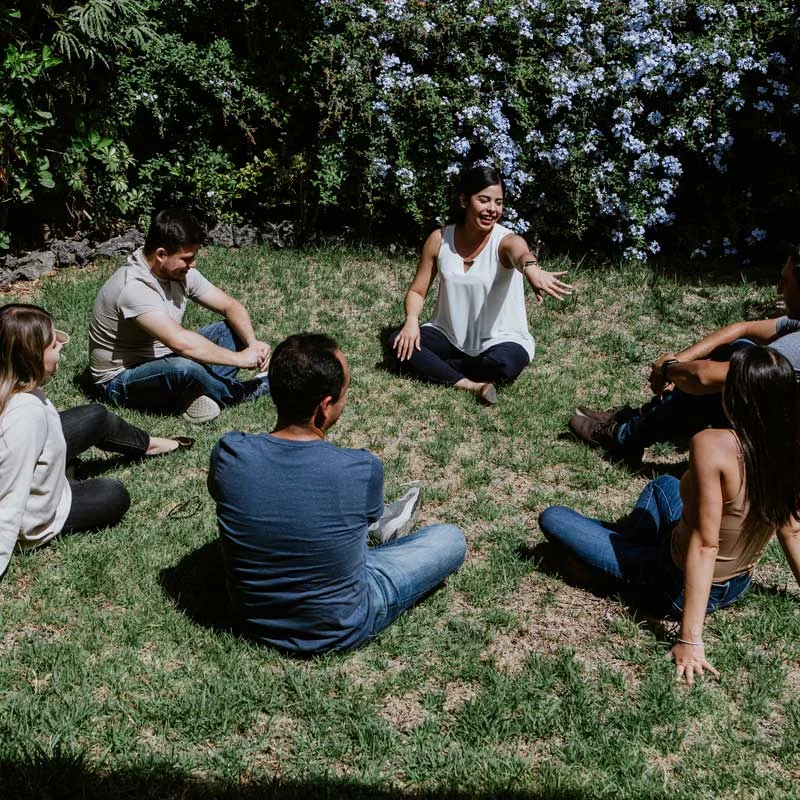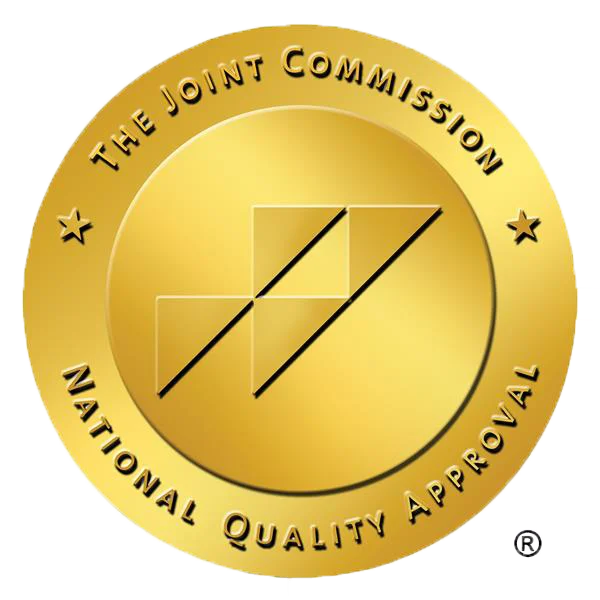At Sheridan Grove Recovery, we believe healing happens through connection. Group therapy is a powerful step toward recovery from substance use. An opportunity for both professional guidance and peer support, this is a safe, structured setting built for transformation. Whether you're in treatment for substance use or working through co-occurring mental health concerns, group therapy sessions provide the space you need to rebuild.
Located in Aurora, Colorado, Sheridan Grove Recovery offers trauma-informed therapy programs just outside of Denver, designed with accessibility in mind. For those covered by Medicaid and other major insurances, our programs provide a judgment-free path to healing and stability.
Compassionate care, centered on you.
What is group therapy?
Group therapy is a form of treatment where individuals meet together under the guidance of a licensed therapist. There, you get to share experiences, listen to the stories of others, glean new coping skills, and build relationships that will likely be a support to you throughout your recovery journey. Group therapy sessions help normalize all the emotions you’re feeling, helping you to realize that you aren’t alone.
At Sheridan Grove Recovery, group therapy isn’t just an add-on. It’s a core part of our residential treatment and detox programs. Peer connection means shifting from isolation to community—an essential component for long-term sobriety.

What you can expect in group therapy
Starting group therapy can feel intimidating, but knowing what to expect can help ease your fears. Most group therapy sessions include 6–12 participants and are led by a trained addiction therapist who guides conversation. Our therapists are skilled at ensuring emotional safety, and will encourage your participation as you become more comfortable.
Each session will follow a structured format, including:
- Sharing updates or feelings with the group
- Guided discussions on topics like triggers, boundaries, or self-worth
- Therapeutic exercises and activities
- Opportunities for reflection, encouragement, and learning from peers
Group therapy is an opportunity to set yourself up for success post-treatment. Building a community of like-minded, sober friends is crucial for your continued progress.
Different types of group therapy
There are a variety of group therapy models, each tailored to address specific aspects of addiction and mental health. Some of the most common formats include:
- Psychoeducational groups: Provide facts about addiction, relapse prevention, and mental health.
- Skills-development groups: Help clients build tools like emotional regulation, communication, and conflict resolution.
- CBT-based groups: Challenge unhelpful thoughts and behaviors through evidence-based strategies.
- Relapse prevention groups: Identify high-risk situations and build coping strategies.
- Support/process groups: Allow clients to share personal experiences and support each other through recovery.
- Trauma-informed groups: A safe environment for clients with trauma histories to process and heal without re-traumatization.
Our clinical team will make recommendations for which type of group might best fit your needs based on your circumstances and unique story. Your treatment plan will never follow a cookie-cutter or one-size-fits-all approach with Sheridan Grove Recovery.
What types of activities happen within group therapy?
Our group sessions often include interactive exercises that help reinforce your recovery goals and build confidence. These may include:
- Identifying personal triggers and developing plans to manage them
- Practicing refusal skills while role-playing
- Journaling, gratitude reflections, or guided meditations
- Art-based activities for non-verbal expression
- Grounding exercises to reduce anxiety or cravings
- Goal-setting and celebrating progress
These activities prepare you for life outside of treatment, while also helping you build friendships and connections that extend far beyond your time at Sheridan Grove Recovery.
Group therapy: A safe space for healing
To ensure all clients feel safe and supported, our group therapy sessions follow a set of guidelines. These group therapy rules help maintain structure and emotional safety:
- Respect confidentiality: What is shared in the group stays in the group.
- Practice active listening: Allow each person to speak without interruption.
- Show up consistently: Your presence supports both you and the group.
- Avoid judgment: Every person is on their own journey.
- Speak from personal experience: Use “I” statements when you share.
These simple, consistent rules allow for deep trust to develop over time, helping each client feel valued. Confidentiality, mutual respect, and non-judgmental communication are core values of ours and are non-negotiable in our group settings.

Stages of group therapy
Just like individuals move through stages of recovery, group therapy progresses through a natural cycle of development:
1. Forming
Members are introduced, and guidelines and expectations are discussed.
2. Storming
Initial conflicts, discomfort, or testing of rules may arise as trust builds.
3. Norming
People begin to feel comfortable; deeper conversations and vulnerability emerge.
4. Performing
Members support one another, contribute meaningfully, and see growth.
5. Adjourning
As clients prepare to transition out of care, the group reflects, celebrates, and brings closure.
Recognizing these stages can help clients feel more confident and committed as they engage.

Effectiveness of group therapy for substance use
Group therapy is a proven, evidence-based approach in the treatment of addiction. Though some people can view group therapy as having lesser value than individual therapy, group therapy can be just as effective.
At Sheridan Grove Recovery, group therapy works in tandem with:
- Medical detox services
- Individual therapy and case management
- Medication-assisted treatment (MAT)
- Trauma-focused therapy and relapse prevention
The communal nature of group work helps reduce shame, encourages accountability, and reinforces a sense of purpose in recovery.
Support group tactics that make a difference
Our therapists use a wide range of support group strategies designed to engage and empower every participant:
- Roundtable check-ins and goal sharing
- SMART goals for weekly progress
- Emotion identification and labeling tools
- Mindfulness and breathing exercises
- Storytelling to highlight personal growth
- Constructive peer feedback and affirmation
Each of these tactics supports a recovery culture built on resilience, acceptance, and shared success.

Benefits of support groups for addiction recovery
Support groups offer benefits that go beyond coping with cravings. They help rebuild lives by offering:
- Belonging: Reduces feelings of isolation and shame
- Insight: Learn from others' experiences and perspectives
- Accountability: Encourages responsibility and progress
- Self-esteem: Builds confidence through shared wins
- Relapse prevention: Strengthens commitment to sobriety
Many clients find that the relationships built in group therapy become a critical part of their recovery network for the long term.
But what if I’m just not a “group person”?
It’s normal to feel unsure about group therapy—especially if you consider yourself introverted, private, or someone who doesn't typically open up around others. Maybe you’ve never felt comfortable in group settings, or the idea of talking in front of strangers feels overwhelming. That’s okay.
At Sheridan Grove Recovery, no one is expected to share before they’re ready. Group therapy is a supportive, go-at-your-own-pace environment where listening is just as valuable as speaking. You can learn and heal just by being present and hearing others' experiences.
You don’t have to be a “joiner” to benefit from group therapy. Over time, many clients who were once hesitant have come to enjoy the sense of belonging and understanding that group work offers. You might be surprised by how healing it can feel simply to be seen and accepted without pressure or judgment.
Our team will always respect your right to privacy while gently encouraging you to share.
How to get started at Sheridan Grove Recovery
Group therapy is integrated into every level of care at Sheridan Grove Recovery. Whether you're beginning with detox or entering residential treatment, you’ll have access to supportive, expertly guided group sessions that align with your unique recovery goals.
We understand the barriers many face when seeking help. That’s why we offer:
- 24/7 admissions
- Transportation to and from our treatment center
- Coverage through Medicaid and most major insurances
- Compassionate staff trained in trauma-informed care
If you're ready to take the next step toward healing, we’re here to walk beside you.
FAQs
No. You're encouraged to participate at your own pace. Many people benefit just by listening until they feel ready to share. Our therapists create a space where silence is respected, and your comfort is prioritized.
Yes. Confidentiality is of the utmost importance and a core group rule. While therapists are bound by professional ethics, all members agree to keep what’s shared in the group private. This helps create a safe, trusting space for everyone.
While both of these groups involve peer interaction, group therapy is led by a licensed clinician and follows a structured, therapeutic format. It includes evidence-based therapies like CBT and is integrated into a comprehensive treatment plan.
Topics vary but often include triggers, cravings, relapse prevention, coping skills, self-esteem, trauma, and personal growth. Sessions may also focus on mental health, communication, and building healthy habits.
You're not alone. Our therapists are trained to support clients who experience social anxiety or trauma histories. You won’t be pushed to talk before you’re ready, and participation is encouraged, but not forced.
Sessions typically last between 45–90 minutes and are held daily or several times per week as part of your residential treatment schedule. Session frequency and duration are designed to support consistent progress.
Group therapy is included in both detox and residential levels of care. During detox, sessions are shorter and more supportive. In residential treatment, group therapy becomes an integral part of your recovery work.
Yes. While Sheridan Grove doesn’t offer outpatient therapy directly, we help connect you with aftercare providers who offer continued group therapy, peer recovery groups, and support networks in your community.
Groups often include people with diverse substance use histories. This type of diversity builds understanding and empathy. Recovery challenges, such as shame, cravings, and rebuilding trust, often mirror each other across substances.
Begin your recovery journey today at Sheridan Grove Recovery
You don’t have to face addiction alone. Group therapy helps you build strength for the world outside of treatment and fortifies you with connection and hope. For more information, you can reach out online or call 303.268.2987.
Healing in the heart of Aurora. Recovery for Greater Denver.
